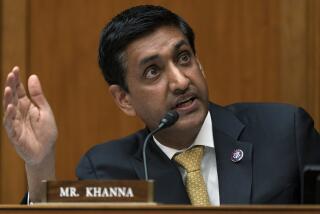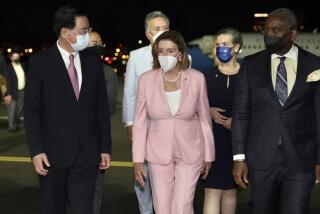House GOP Wants U.S. Pro-Taiwan
- Share via
WASHINGTON — Breaking with nearly two decades of American policy, House Republicans called Tuesday for explicit guarantees of a U.S. military defense of Taiwan if the island should be attacked by China.
The decision--enshrined in a formal statement by the House Republican Policy Committee and included in a resolution introduced Tuesday--came less than a day after China announced new missile tests that will come closer than ever before to the shores of Taiwan.
“The Republican majority in Congress is sending this message to Beijing: Back off,” said California Rep. Dana Rohrabacher (R-Huntington Beach), one of several Republican members of Congress who appeared at a news conference to unveil the policy. Their nonbinding resolution would express the sense of Congress that “U.S. military forces should defend Taiwan in the event of invasion, missile attack or blockade by the People’s Republic of China.”
The administration had no immediate comment.
The Republican resolution is the latest in a series of recent signals that Taiwan is becoming a serious political issue in American politics. “I would support Taiwan having a seat” in the United Nations, Republican presidential front-runner Bob Dole said last weekend, in effect challenging another tenet of long-standing U.S. policy on China and Taiwan. “Whether I could get that accomplished or not, I don’t know.”
Meanwhile, the Clinton administration is preparing for new high-level talks with China, aimed at easing the tensions over Taiwan and over China’s sales of nuclear technology to Pakistan. Liu Huaqiu, who serves as national security advisor for the State Council under Premier Li Peng, is scheduled to arrive in Washington later this week for talks with Secretary of State Warren Christopher and White House National Security Advisor Anthony Lake.
China maintains that Taiwan is part of its territory. The United States had a formal defense treaty with Taiwan until 1979, when it decided to cut ties to the government and establish diplomatic relations with China. Since then, American policy has been based on the idea of deliberately preserving uncertainty about what it would do if war broke out between China and Taiwan.
This policy of “strategic ambiguity,” followed by the Carter, Reagan and Bush administrations as well as by Clinton, has been aimed at avoiding giving either China or Taiwan a blank check in their dealings with each other.
“This is certainly not a Clinton policy, and it is not a Democratic policy,” said Georgetown University historian Nancy Bernkopf Tucker. “[The concept of] strategic ambiguity goes back to the Eisenhower administration. It began with [President] Eisenhower and [Secretary of State John Foster] Dulles not wanting the Chinese to know what we were going to do in the Taiwan Strait.”
Defenders of the policy of ambiguity argue that if China knew that the United States would not become involved in a conflict, it would have vastly greater leverage in dealing with Taiwan. On the other hand, if Taiwan knew that the United States would automatically come to its defense, that would strengthen its hand in any dispute with Beijing.
“Beijing should worry a lot about how we would react [in a conflict], and Taiwan should be very uncertain about how far along we would go with them if they unilaterally took it upon themselves to head down a collision course with Beijing,” explained Arnold Kanter, a former Bush administration official who is now with the Washington-based Forum for International Policy.
Now, China’s recent military exercises, aimed at rattling Taiwan during its first direct presidential election, have prompted truculent American lawmakers to make it clear for the first time that the United States will come to the aid of the island.
“All of these things [China’s military exercises] are changed circumstances, and they require a response,” said California Rep. Christopher Cox (R-Newport Beach), chairman of the Republican Policy Committee and sponsor of Tuesday’s policy statement.
Some of the Republican members of Congress appearing with Cox at the news conference went further, suggesting that they want to return to the old days when America supported Nationalist China.
“Since Chiang Kai-shek, Taiwan has been a strong and faithful ally of America,” declared Rep. Dan Burton (R-Ind.). Chiang was the Nationalist Chinese leader who fled the Chinese mainland for Taiwan in 1949 and ruled the island until his death in 1975. Unlike Taiwan’s current leaders, he sought to regain control of the Chinese mainland, by force if necessary.
One veteran Republican official, former U.S. Ambassador to China James R. Lilley, acknowledged that the Reagan and Bush administrations never gave Taiwan the sort of ironclad guarantees that the House leadership is now urging on the Clinton administration.
However, Lilley added: “We haven’t since 1979 faced the kind of [Chinese] provocations [over Taiwan] we’re facing now.”
More to Read
Sign up for Essential California
The most important California stories and recommendations in your inbox every morning.
You may occasionally receive promotional content from the Los Angeles Times.










